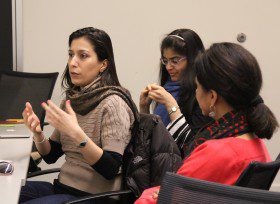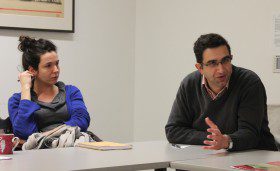On February 26, the South Asia Institute Graduate Student Associates (GSAs) hosted an interactive workshop for students considering doing research in South Asia. The GSAs shared their experience doing research in the field, and their diverse backgrounds working with NGOs and government organizations. The workshop was designed to be helpful for students contemplating or preparing for research abroad.
Based on the discussion, here are 10 pieces of advice for doing fieldwork in South Asia:
1. Do a lot of research before.
The GSAs all emphasized that preparing for your time in South Asia is important – read up on everything from local culture and customs,the availability of resources, any ethical research guidelines you need to follow, and even appropriate dress, especially for women. Having local connections when you arrive can be very important, and SAI has many contacts that can assist with your research. Don’t be afraid to reach out, even by cold calling.

Mariam Chughtai, Ed.D. Candidate, Harvard Graduate School of Education, explains her research in Pakistan
2. Be patient.
If you are planning on doing any archival research, you may be frustrated by the lack of organization at many institutions. Don’t let this discourage you – the GSAs said that there are so many great resources available and many people just haven’t had the time to sort through all of them.
3. Be flexible.
There is a good chance that things will not go as planned, especially in a place like South Asia. Being flexible is important, as is the willingness to change your research focus based on the progress of your fieldwork. And don’t be worried if your research is taking longer than you expected; according to the GSAs, this is normal for South Asia. Being open-minded to your research methods is also helpful, as some GSAs found that technology and websites were useful resources as well.
4. Invest enough time in a place to build relationships.
Building a personal network is especially important if you are working with people. The GSAs said that you will never know when you may need the help of a local. Whether it’s waiting for hours for access to an archive, dealing with a language barrier, or finding appropriate clothes for a hike the Himalayas, forming solid relationships with locals is important for unexpected events.
5. When building relationships, be strategic.
The GSAs explained that when forming relationships with locals, you should recognize your strengths and weaknesses. Understanding how you can help them – by understanding your own skills that you can offer – can be just as important in understanding how they can help you.
6. Don’t be intimidated by bureaucracy.
If you are doing research with data or government agencies, you will probably have to jump through many hoops to obtain information. One GSA said that India is one of the most data-rich countries for quantitative social science research – you just need to know how to manage the system.
7. Recognize barriers that you cannot change – but also learn to work around them in creative ways.
One GSA explained that although being a woman seemed to garner suspicion and the feeling that she was not being taken seriously in her research placement, she found that it could also be an advantage by making her seem less intimidating, and giving her more access than if she was a man. Recognize these barriers, but don’t let them be an obstacle.
8. If you can, work with a team.
One GSA, who did field research in Pakistan as part of a team, explained that having other researchers in the field to debrief with was helpful for her research. If possible, having a network like this can be valuable.
9. Be observant, and know when to keep your opinion to yourself.
Chances are you will encounter people whose opinions you do not agree with while doing research, especially if you are researching policy or politics. Being observant and an emphatic listener can be helpful for your research.
10. Bring a lot of passport photos.
If there’s one piece of advice that you should take, this is it. You will need the photos for many things, including getting a sim card and a cell phone.
Click here to listen to the full podcast for more advice.
Read more about the GSA program here.
The following GSAs participated: Mariam Chughtai, Ed.D. Candidate, Harvard Graduate School of Education, Aditya Dasgupta, PhD Candidate, Department of Government, Madhav Khosla, PhD. Candidate, Political Theory, Corrina Moucheraud, Doctoral Candidate, Harvard School of Public Health, Dinyar Patel, PhD candidate, Department of History and Erum Sattar, SJD Candidate, Harvard Law School. Shankar Ramaswami, South Asia Institute South Asian Studies Postdoctoral Fellow, moderated the workshop.

